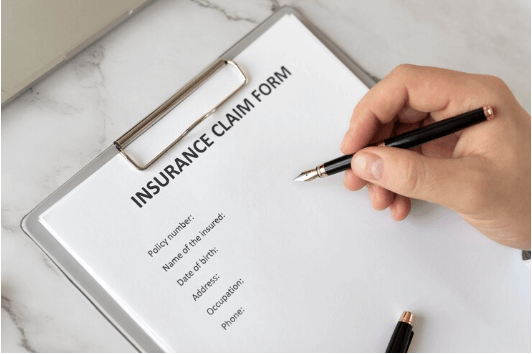When to file an insurance claim In 2024 | An Ultimate Guide
Knowing when to file an insurance claim is crucial. After an incident, assess damages, review policy terms, and consider costs. If damages exceed deductibles and fall within coverage, file promptly. Cooperation with claims adjusters and maintaining records help ensure a smooth process, enabling timely financial support in times of need.
Contents
- 1 When to file an insurance claim
- 2 Importance of Insurance claim
- 3 Understanding Insurance Claim
- 4 Assessing the Situation Is Your Incident Covered?
- 5 Immediate Emergencies Prioritizing Safety and Prompt Action
- 6 Evaluating Damages
- 7 Cost Consideration
- 8 Reviewing Policy Terms
- 9 Notifying Your Insurance Provider
- 10 Cooperating with Claims Adjusters
- 11 Balancing Claims and Premiums
- 12 Professional Advice Seeking Help When Needed
- 13 Maintaining Records Documenting Communication for Clarity
- 14 FAQs
- 15 Conclusion
When to file an insurance claim
Insurance is designed to provide financial protection and peace of mind in times of need. Whether it’s a car accident, property damage, or a medical emergency, understanding when to file an insurance claim is crucial for a smooth and efficient process. In this article, we will explore the key factors to consider when deciding the right time to file an insurance claim.
Assess the Situation
Assessing the situation is the first step in determining whether to file an insurance claim. It involves carefully evaluating the nature and extent of the incident, considering if it falls within the coverage of your policy. Whether it’s a car accident, property damage, or a health-related issue, understanding the specifics is essential. Identify the parties involved, document damages, and gather relevant information. This assessment not only helps you decide whether to file a claim but also provides vital details when reporting the incident to your insurance provider. Being thorough in your evaluation ensures a smoother claims process, helping you make informed decisions during a challenging time.
Immediate Emergencies
Immediate emergencies demand swift and decisive action, prioritizing safety above all else. Whether it’s a car accident, sudden health crisis, or natural disaster, quick response can save lives. In these situations, the primary focus should be on ensuring the well-being of everyone involved. Call emergency services promptly, provide first aid if necessary, and move to a safe location. After addressing immediate medical needs and ensuring everyone’s safety, it’s essential to contact relevant authorities and your insurance provider promptly. Reporting the incident immediately not only aids in faster response from emergency services but also initiates the insurance claims process swiftly, ensuring timely assistance and support during these critical moments.
Evaluate the Damages
Evaluating damages after an incident is vital for a successful insurance claim. Thoroughly assessing the extent of the damage, whether to property, vehicles, or health, is essential. Take clear photographs, document all visible losses, and gather necessary information, such as names, contact details, and insurance information of parties involved. This meticulous documentation strengthens your claim, providing concrete evidence for your insurance provider. It not only expedites the claims process but also ensures a fair settlement. Being diligent in evaluating damages demonstrates the accuracy and seriousness of your claim, making it easier for insurance adjusters to assess the situation and process your claim efficiently.
Consider the Costs
When deciding to file an insurance claim, considering the costs is paramount. Compare the estimated expenses of repairs, medical treatments, or property replacements against your insurance deductible. If the costs are significantly lower than your deductible, it might be more practical to cover them out of pocket. Filing minor claims close to or below the deductible could result in increased premiums, outweighing the benefits of the claim. Carefully weighing the financial aspects helps you make an informed decision, ensuring that you use your insurance coverage judiciously and avoid unnecessary hikes in premiums while still utilizing the insurance when it truly makes a substantial financial difference.
Review Policy Terms
Reviewing your insurance policy terms is crucial before filing a claim. Understanding the specifics of your coverage, including deductibles, limits, and claim deadlines, is essential. Carefully read through the policy document or contact your insurance provider to clarify any uncertainties. Be aware of the conditions under which your policy provides coverage, ensuring your situation falls within the defined parameters. Pay attention to any waiting periods or exclusions. Being well-informed about your policy terms helps you make an informed decision about whether to proceed with a claim. It ensures that you meet all requirements and deadlines, increasing the likelihood of a successful and hassle-free claims process.
Notify Your Insurance Provider
Timely communication with your insurance provider is paramount when filing a claim. Once you’ve assessed the situation and decided to proceed, notify your insurance company promptly. Most insurers have dedicated hotlines and online portals for reporting claims. Provide accurate and detailed information about the incident, including the date, time, and a description of what occurred. Be prepared to share any documents or evidence, such as photographs or witness statements, to support your claim. Prompt notification initiates the claims process swiftly, allowing the insurance company to assess the situation promptly and provide the necessary support. Clear and timely communication with your insurer ensures a smoother and more efficient claims experience.
Cooperate with the Claims Adjuster
Cooperating fully with the claims adjuster is crucial during the insurance claims process. The adjuster assesses the damages, verifies information, and determines the claim’s validity. Be transparent, providing accurate details about the incident and any documentation required promptly. Answer their questions truthfully and comprehensively. Accommodate their requests for inspections or additional information, ensuring a smooth evaluation of your claim. Clear and honest communication expedites the process, increasing the likelihood of a fair and timely settlement. Working collaboratively with the claims adjuster demonstrates your willingness to cooperate, fostering a positive relationship and ensuring that your claim is processed efficiently and resolved to your satisfaction.
Understand the Consequences
Understanding the consequences of filing an insurance claim is crucial for your financial future. While insurance provides essential protection, frequent or unnecessary claims can lead to increased premiums. Consider the long-term impact on your policy rates before filing a claim, especially for minor damages that you can afford to cover personally. Higher premiums could outweigh the benefits of a small claim. Additionally, multiple claims within a short period might label you as high-risk, affecting your insurability. Carefully weigh the costs and benefits, ensuring that the potential financial repercussions align with the significance of the claim. Being mindful of these consequences helps you make informed decisions, ensuring your insurance remains affordable and effective.
Consider Professional Advice
Considering professional advice when dealing with insurance claims can be invaluable. Public adjusters or legal experts specialize in navigating complex insurance processes, ensuring you receive a fair and just settlement. If you encounter difficulties understanding policy terms, face disputes, or experience delays, consulting these professionals can provide expert guidance. They assess your situation, advocate on your behalf, and negotiate with the insurance company to maximize your claim. Their expertise helps you avoid pitfalls and ensures you receive the compensation you deserve. While there might be a cost associated with their services, the benefits often outweigh it, ensuring a smoother and more favorable resolution to your insurance claim challenges.
Maintain Records

Maintaining detailed records is essential throughout the insurance claims process. Document all communication with your insurance provider, including emails, phone calls, and in-person meetings. Keep a record of claim numbers, dates, and the names of the representatives you speak with. Additionally, organize receipts, invoices, photographs, and any other relevant documents related to the incident. Having a comprehensive and well-organized file can be instrumental in resolving disputes or discrepancies. It provides a clear trail of evidence, strengthening your case and ensuring that you have the necessary information readily available. These records serve as a valuable reference, helping you stay informed and in control during the entire claims journey.
Importance of Insurance claim
Insurance claims play a pivotal role in safeguarding individuals and businesses against unforeseen events, providing financial security and peace of mind. The importance of insurance claims can be understood through several key aspects:
Financial Protection
Financial protection, a core aspect of insurance, offers a shield against unexpected and costly events. It serves as a safety net, safeguarding individuals, families, and businesses from the financial burdens arising from accidents, natural disasters, or health emergencies. Insurance policies, whether for health, property, or vehicles, provide the necessary funds to cover repairs, medical bills, or replacements, reducing the impact of unforeseen circumstances on one’s finances. This protection ensures that people can navigate challenging situations without facing crippling debt or financial ruin, promoting stability, and providing the freedom to pursue their goals with confidence and peace of mind.
Restoration of Normalcy
The restoration of normalcy is a fundamental benefit of insurance. In the aftermath of disasters, accidents, or crises, insurance claims enable individuals and businesses to rebuild and recover swiftly. By providing necessary funds for repairs, replacements, or medical expenses, insurance facilitates the return to regular life and operations. This rapid recovery process is vital, reducing disruptions to daily routines and business activities. It allows people to focus on healing, rebuilding, and moving forward without the overwhelming financial burden. The assurance that insurance offers in restoring normalcy promotes resilience, encouraging individuals and businesses to bounce back stronger after challenging situations.
Risk Management
Insurance serves as a cornerstone of effective risk management for both individuals and businesses. By transferring financial risks to insurers, policyholders mitigate potential losses arising from accidents, disasters, or liabilities. This risk management strategy provides a sense of security, enabling businesses to operate confidently and invest in growth opportunities. For individuals, insurance offers protection against unexpected medical expenses, property damages, or legal liabilities, preventing personal financial crises. By minimizing the impact of unforeseen events, insurance supports strategic decision-making, promotes financial stability, and fosters a proactive approach to managing various risks, allowing individuals and businesses to focus on their goals without fear of significant financial setbacks.
Preventing Financial crisis
Insurance plays a vital role in preventing financial crises by offering a crucial financial safety net. In the face of unexpected events such as accidents, health emergencies, or property damage, insurance policies provide the necessary funds to cover expenses, preventing individuals and businesses from facing overwhelming debt or bankruptcy. By shouldering the financial burden, insurance allows for a swift recovery without depleting savings or assets, ensuring that daily lives and business operations can continue relatively uninterrupted. This proactive approach to risk management safeguards against catastrophic financial setbacks, promoting stability, and empowering individuals and businesses to navigate challenging situations without falling into financial crisis.
Promoting Responsible Behavior
Insurance plays a pivotal role in promoting responsible behavior among individuals and businesses. To secure coverage, policyholders must adhere to safety guidelines and regulations, encouraging a proactive approach to risk management. By incentivizing safe practices, insurance helps prevent accidents and losses, creating safer environments for all. This responsible behavior not only reduces the frequency of claims but also fosters a culture of awareness and accountability. Additionally, it contributes to safer communities, workplaces, and roads. Through these measures, insurance not only protects against financial losses but also actively cultivates a sense of responsibility, emphasizing the importance of precautions and prudent decision-making in everyday life and business operations.
Peace of Mind
Peace of mind is the invaluable gift insurance bestows upon individuals and businesses. Knowing that insurance coverage exists provides a profound sense of security, eliminating worries about unforeseen events. Whether it’s health, property, or life insurance, the assurance of financial protection allows people to live their lives without the constant fear of financial ruin. This peace of mind enables individuals to plan for the future, invest confidently, and pursue their goals without the looming threat of unexpected financial burdens. It fosters a sense of stability, reducing stress, and anxiety, thereby enhancing overall well-being. Ultimately, peace of mind is the true essence of insurance, offering the freedom to live life to the fullest.
Understanding Insurance Claim
Understanding insurance claims is essential for individuals and businesses alike, as it ensures a smooth process during unexpected events. An insurance claim is a formal request made by the policyholder to the insurance company seeking coverage or compensation for a covered loss or policy event. To navigate this process effectively, one must comprehend the nuances involved.
Firstly, it’s crucial to be aware of the type of insurance coverage you have, whether it’s for health, property, vehicle, or any other specific need. Familiarize yourself with the policy terms, including deductibles, coverage limits, and exclusions. Assessing the situation accurately is the initial step. Determine if the incident falls within the coverage of your policy and if it’s financially viable to file a claim considering your deductible. Immediate emergencies, such as accidents or injuries, require prompt action prioritizing safety.
Once safety is ensured, notifying the insurance provider is essential. Provide detailed information about the incident, including dates, facts, and any involved parties. Document the damages thoroughly, as visual evidence strengthens your claim. It’s equally important to cooperate fully with the claims adjuster during the assessment process. Answer their questions honestly, provide necessary documentation, and allow inspections if required. Keeping detailed records of all interactions with the insurance company, including emails and phone calls, is vital for clarity and reference.
Understanding the insurance claim process empowers policyholders to make informed decisions and ensures a smoother experience. It not only expedites the claims process but also increases the likelihood of a fair and timely settlement. By being aware of policy terms, assessing situations accurately, and maintaining clear communication, individuals and businesses can navigate the complexities of insurance claims with confidence, ensuring that they receive the financial support they need during challenging times.
Assessing the Situation Is Your Incident Covered?
Assessing the situation is the foundational step when considering filing an insurance claim. Understanding whether your specific incident is covered under your insurance policy is paramount. Policies vary widely, so it’s essential to review the terms and conditions of your coverage thoroughly. Whether it’s a car accident, property damage, or a health-related issue, the policy documentation outlines the circumstances under which you are eligible to file a claim. Identifying whether the incident falls within these defined parameters is crucial.
Start by carefully reading your policy document. Look for the coverage limits, deductibles, and any exclusions that might apply to your situation. If you’re unsure about the coverage, contact your insurance provider to clarify any ambiguities. It’s common for policies to have limitations on specific types of incidents or to exclude certain events from coverage. For example, some insurance policies might not cover damages caused by natural disasters or accidents that occur under the influence of alcohol.
Additionally, consider the extent of the damages or losses incurred. Insurance policies often have thresholds, such as minimum claim amounts, which need to be met for the claim to be valid. Evaluate the situation objectively, taking into account both the severity of the incident and the financial implications.
By thoroughly assessing the situation and understanding your policy’s terms and limitations, you can make an informed decision about whether to file a claim. Being aware of your coverage ensures that you don’t waste time and effort pursuing a claim that isn’t eligible for compensation, allowing you to focus on appropriate actions if your incident falls within the coverage parameters.
Immediate Emergencies Prioritizing Safety and Prompt Action
In times of immediate emergencies, prioritizing safety and taking prompt action are paramount. Whether it’s a car accident, a sudden health crisis, or a natural disaster, the first and most crucial step is to ensure the safety of everyone involved. Call emergency services immediately if necessary and provide first aid or assistance to those in need. Moving to a safe location away from potential dangers should be a priority to prevent further harm.
Once safety is ensured, it’s imperative to take prompt action. Contact your insurance provider as soon as possible to report the incident. Most insurance companies have dedicated hotlines or online portals for reporting emergencies. Providing accurate and detailed information about the incident is crucial. Include essential details such as the date, time, location, and a description of what occurred. The sooner you report the incident, the faster the insurance company can initiate the claims process, ensuring timely assistance and support.
Prompt reporting not only expedites the process but also enables emergency responders and authorities to act swiftly if necessary. It facilitates a coordinated response, ensuring that medical attention is provided promptly, damaged property is secured, or other necessary measures are taken to mitigate further damage or injuries. In immediate emergencies, every moment counts, and quick action can make a significant difference in minimizing the impact of the incident.
By prioritizing safety and taking swift action, individuals can not only ensure their well-being and that of others but also facilitate a faster and more efficient response from emergency services and insurance providers. This proactive approach can lead to a smoother resolution of the situation and timely assistance during critical moments.
Evaluating Damages
Evaluating damages thoroughly is a crucial step when preparing to file an insurance claim. Proper documentation and assessment of the extent of the damage can significantly impact the success and efficiency of the claims process. Start by documenting the damages meticulously. Take clear photographs and videos of the affected areas or items from various angles. These visual records serve as vital evidence and provide a clear representation of the damage incurred. Additionally, gather any relevant documents, such as receipts, invoices, or repair estimates, to support your claim.
Next, assess the extent of the damages accurately. This assessment includes not only the visible damage but also potential hidden or structural issues that might have occurred. It is advisable to consult professionals, such as contractors, mechanics, or medical professionals, for a comprehensive evaluation, especially if the damages are extensive. Their expertise can provide a detailed assessment, helping you understand the full scope of the damage and the necessary repairs or treatments required.
When assessing damages, consider both immediate and long-term implications. For instance, in the case of a car accident, evaluate not only the visible exterior damage but also potential engine or frame issues. Similarly, in property damage claims, consider structural damages that might not be immediately visible but can pose risks in the future.
By documenting damages thoroughly and assessing their extent accurately, you provide your insurance provider with the essential information needed to process your claim efficiently. Clear, detailed records and assessments facilitate a smooth claims process, ensuring that you receive a fair and timely settlement. Additionally, it demonstrates your diligence and helps in justifying the compensation you are seeking, leading to a more successful resolution of your insurance claim
Cost Consideration
When deciding whether to file an insurance claim, carefully considering the costs involved and weighing them against your deductibles is essential. The deductible is the amount you agree to pay out of pocket before your insurance coverage kicks in. Before initiating a claim, assess the estimated expenses for repairs, medical treatments, or replacements. Compare these costs to your deductible. If the damages are slightly above or close to your deductible, it might be more cost-effective to cover the expenses yourself without involving the insurance company. Filing a claim for minor damages near the deductible amount can lead to increased premiums in the future, potentially outweighing the benefits of the claim.
Additionally, consider the long-term impact on your insurance premiums. Frequent or unnecessary claims can label you as a high-risk policyholder, leading to higher insurance costs in subsequent years. It’s essential to weigh the potential increase in premiums against the benefits of the claim. If the claim amount is significantly higher than your deductible and justifies the potential premium hike, filing a claim might be a prudent decision. However, for minor damages or expenses close to the deductible, covering the costs personally can prevent long-term financial repercussions.
By carefully considering the costs and comparing them to your deductible, you can make an informed decision about whether to file an insurance claim. Evaluating the financial aspects ensures that you utilize your insurance coverage judiciously, preserving your policy’s value for more substantial and impactful situations, while also preventing unnecessary increases in your insurance premiums in the long run.
Reviewing Policy Terms
Reviewing policy terms thoroughly is vital when it comes to filing an insurance claim, as it ensures you meet all deadlines and requirements stipulated in your policy. Each insurance policy comes with specific terms and conditions, including deadlines for filing claims and requirements for documentation. Familiarize yourself with these details, paying close attention to the time frame within which a claim must be reported after an incident occurs. Missing these deadlines might result in a denial of the claim.
Understanding the documentation requirements is equally important. Insurance companies often ask for specific information, such as incident reports, photographs, estimates, and other proof related to the claim. Being aware of these requirements in advance allows you to gather the necessary documents promptly, ensuring a smooth and expedited claims process.
Moreover, policies may contain clauses regarding the types of incidents covered, deductibles, and coverage limits. Thoroughly comprehending these aspects is crucial to avoid misunderstandings during the claims process. If you have any uncertainties, do not hesitate to reach out to your insurance provider for clarification. Clear communication with your insurer can prevent potential issues and help you navigate the claims process with confidence.
Reviewing policy terms helps you understand the deadlines and requirements associated with your insurance claim. By staying informed and meeting these criteria, you significantly enhance the likelihood of a successful and hassle-free claims experience. It ensures that you fulfill all obligations as a policyholder, allowing the insurance company to process your claim efficiently and provide the necessary support in times of need.
Notifying Your Insurance Provider

Notifying your insurance provider promptly and efficiently after an incident is essential when filing a claim. Most insurance companies offer dedicated hotlines or online portals to report claims, providing convenient and swift ways to initiate the process. When reporting a claim, it’s crucial to provide accurate and detailed information about the incident. Include essential details such as the date, time, location, and a description of what occurred. Be honest and thorough in your account of the events, as any discrepancies might cause delays or complications in the claims process.
Additionally, be prepared to provide any supporting documents or evidence related to the claim. This may include photographs, police reports, medical records, or estimates for repairs. Gathering and submitting these documents promptly can expedite the evaluation process, helping the insurance company assess the situation more efficiently.
Clear and concise communication is key when reporting a claim. Be responsive to any inquiries from the insurance provider, promptly providing any additional information they may request. Cooperate fully with the claims adjuster, answering their questions honestly and providing any necessary documentation. By being proactive, responsive, and transparent throughout the process, you not only facilitate a smoother claims experience but also demonstrate your cooperation, increasing the likelihood of a fair and timely settlement.
Promptly notifying your insurance provider and maintaining open communication throughout the claims process ensures that you receive the necessary support and financial assistance in a timely manner. It helps the insurance company assess the situation accurately, process your claim efficiently, and provide the assistance you need during challenging times.
Cooperating with Claims Adjusters
Cooperating fully with claims adjusters is integral to a successful insurance claims process. These professionals assess the damages, verify information, and determine the validity of the claim. It is crucial to provide accurate and comprehensive details about the incident, ensuring the adjuster has a clear understanding of the situation. Be honest and transparent in your communication, offering precise accounts of the events leading to the claim. Providing photographic evidence, eyewitness statements, and any relevant documents can strengthen your case significantly. Additionally, be open to answering the adjuster’s questions promptly and thoroughly. Clear and precise responses help the adjuster evaluate the claim efficiently, leading to a fair and timely settlement.
Maintaining accuracy in the information you provide is paramount. Exaggerating or misrepresenting facts can lead to complications and delays in the claims process, potentially affecting the outcome. By being truthful and cooperative, you establish credibility, enhancing the adjuster’s confidence in your claim’s validity.
Furthermore, it is crucial to keep detailed records of all interactions with the claims adjuster, including emails, phone conversations, and in-person meetings. These records serve as essential references, ensuring you have a clear account of the communication exchanged. Accurate records help prevent misunderstandings and discrepancies, allowing for a smoother claims resolution process.
Cooperation with claims adjusters is a collaborative effort. By providing accurate, honest, and detailed information, policyholders facilitate a thorough evaluation, expediting the claims process. Transparency and open communication not only enhance the adjuster’s ability to assess the situation but also contribute significantly to a fair and efficient resolution of the insurance claim.
Balancing Claims and Premiums
When contemplating filing an insurance claim, it’s crucial to consider the long-term impact on your premiums and overall financial stability. Insurance claims, especially frequent or unnecessary ones, can lead to higher premiums in the future. Insurance companies assess the risk profile of policyholders based on their claims history. Multiple claims within a short period can categorize you as high-risk, potentially resulting in substantial premium increases. Therefore, it’s essential to weigh the benefits of the claim against the potential rise in premiums over time.
Balancing claims and premiums involves evaluating the financial implications. Assess the total costs of the damages or losses against your deductible and potential future premium hikes. If the claim amount is significantly higher than your deductible and justifies the potential premium increase, filing a claim might be warranted. However, for minor damages or expenses close to the deductible, covering the costs personally can prevent long-term financial repercussions.
Consider the impact on your budget and financial goals, ensuring that filing a claim aligns with your overall financial strategy. Moreover, maintaining a low claims frequency can help secure lower premiums and better policy terms in the future. Responsible and strategic decision-making regarding insurance claims ensures that your coverage remains affordable and effective.
It’s essential to strike a balance between utilizing insurance benefits when necessary and avoiding unnecessary claims to preserve your long-term financial well-being. By considering the long-term implications, you make informed decisions, safeguard your financial stability, and ensure that insurance continues to serve its purpose as a protective and cost-effective tool.
Professional Advice Seeking Help When Needed
Seeking professional advice is paramount when dealing with complex insurance claims. Public adjusters and legal experts specialize in navigating the intricate processes of insurance policies, ensuring policyholders receive fair and just settlements. Their expertise can be invaluable when policyholders encounter difficulties understanding policy terms, face disputes, or experience delays in claim processing. Public adjusters assess the situation, advocate on behalf of policyholders, and negotiate with insurance companies to maximize claims. Legal professionals provide legal counsel, ensuring policyholders understand their rights and obligations. Their expertise is especially crucial in cases involving denied claims or disputes with insurance providers.
Additionally, professionals such as public adjusters and attorneys possess in-depth knowledge of insurance laws and regulations, enabling them to navigate complex policies and advocate for policyholders effectively. They help interpret policy terms, assess the validity of the claim, and ensure policyholders receive rightful compensation. While there might be a cost associated with their services, the benefits often outweigh the expense. Their assistance can expedite the claims process, prevent unnecessary financial losses, and provide peace of mind during challenging times.
Professional advice serves as a valuable resource for policyholders navigating insurance claims. Their expertise not only simplifies the process but also ensures policyholders receive the compensation they deserve. Consulting with professionals can mitigate stress, provide clarity, and significantly increase the chances of a successful resolution, making the investment in their services a wise decision when dealing with complex insurance matters.
Maintaining Records Documenting Communication for Clarity
Maintaining meticulous records is crucial when dealing with insurance claims, especially for communication with insurance providers. Documenting all interactions, including emails, phone calls, and letters, ensures clarity and prevents misunderstandings during the claims process. Keep a detailed log of dates, times, the names of the representatives you speak with, and the content of the conversation. These records serve as a reference, providing a clear account of the communication exchanged between you and your insurance company.
Additionally, it’s essential to keep records of all documents related to the claim, such as photographs, estimates, police reports, and medical bills. Organize these documents systematically, making it easier to provide necessary information when required. Accurate and comprehensive documentation strengthens your case and provides concrete evidence in support of your claim.
Clear communication records also serve as a safeguard in case of disputes or discrepancies. If there are misunderstandings or disagreements during the claims process, these records can be invaluable in resolving conflicts. They provide a transparent timeline of communication, helping to clarify any misunderstandings and ensuring that your concerns are addressed promptly and accurately.
Moreover, maintaining records is not only beneficial during the claims process but also aids in evaluating the overall effectiveness of your insurance coverage. By keeping track of your interactions, you can assess the responsiveness and efficiency of your insurance provider. This information can be valuable when deciding whether to continue with the same insurer or explore other options in the future.
Maintaining detailed records of all communication and documents related to your insurance claim is essential. These records promote clarity, provide evidence, and act as a valuable resource throughout the claims process, ensuring a smooth experience and helping you protect your rights as a policyholder.
FAQs
When would you make an insurance claim?
Common contents insurance claims include cover for accidental damage or loss due to fire, burglary or natural disaster. Some insurance policies also cover you in case you accidentally damage someone else’s property.
When and how should I file a claim?
File an insurance claim when an incident occurs, promptly notifying your provider. Provide accurate details, supporting documentation, and cooperate with claims adjusters. Timely reporting and clear communication are key to a successful claims process.
What happens to my insurance if I claim?
Although the amount will depend on who’s to blame, the severity of the accident, and your own driving record, you should expect your car insurance to increase by about 20-50% after making a claim.
Can you claim insurance if it was your fault?
This would be a split liability claim. Split liability claims require evidence that establishes that the other liable party was partially responsible for the accident in which you sustained harm. You will be unlikely to claim compensation if you’re fully to blame for a car accident.
How many types of claims are there in insurance?
Typically, there are three types of term insurance claims that are common in almost all the term insurance policies available in the market. They are: Death benefit claim. Maturity benefit claim (Only in case of Term Insurance with Return of Premium or TROP)
Conclusion
Filing an insurance claim requires careful consideration and timely action. Understanding policy terms, assessing damages, and weighing costs against deductibles are crucial steps. Cooperation with claims adjusters, seeking professional advice when needed, and maintaining accurate records enhance the process. By balancing these factors, policyholders can navigate the complexities of insurance claims effectively, ensuring a swift and fair resolution during challenging times.







